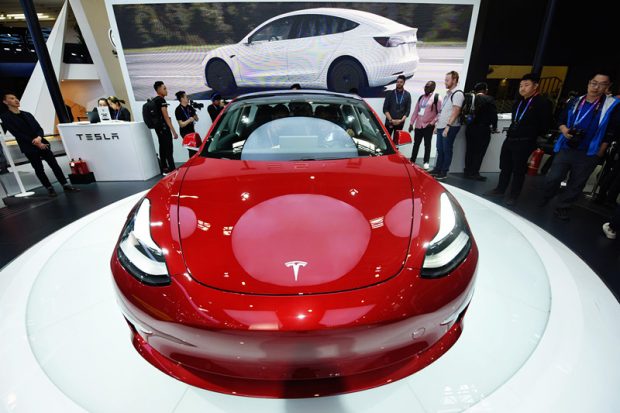China’s car market energized by opening up efforts

The photo shows a Tesla Model 3 at a car exhibition in Beijing, April 25, 2018. (Photo: People’s Daily Online)
In the Tesla’s new gigafactory in Shanghai, hammer apparatus, excavators, dumper lorries, and dozens of electric workers are busy with the construction of a plant that is capable of producing 500,000 cars each year upon completion. As the first wholly foreign-owned new-energy car subsidiary in China, the super factory received 50 billion yuan ($7.45 billion) of investment from Tesla. Started on January, the project is scheduled to be completed in July and put into operation by the end of 2019, which stands for a high-efficient job since it usually takes at least 18 months to build such a sizable factory.
The US electric car maker is one of the latest and symbolic beneficiaries of China’s new round of efforts to open up the auto sector. The country announced to phase out share-holding limits for foreign investors in automobile sector last April and cut import tariffs on vehicle products a month later. Thanks to the stepped-up efforts in opening up the sector, Tesla inked the agreement to set up wholly-owned subsidiary in China last July, and German automaker BMW took a majority stake in its China joint venture in October 2018, making itself the first beneficiary since China relaxed the joint-venture equity limit for automobile sector. In six months, the country’s determination to deliver its words has ignited enthusiasm of auto makers across the world to put a bet on the Chinese market. Five months after Tesla sealed the agreement of plant establishment in July 2018, it moved fast to break the ground in this January.
Elon Musk, CEO of the American car manufacturer, wowed China’s impressive development speed and working efficiency, saying that it is hard to imagine that the process of opening a car factory could be done in such a short period of time. It is benefited from China’s sound business environment and demonstrates China’s resolution to open up to the outside world, he added. BMW is another foreign investor gripped by China’s resolution. The Munich-based maker, on October 11, 2018, announced to increase investment in the joint venture it set up with Chinese partner Brilliance Auto. A groundbreaking ceremony was held for a new BMW Brilliance plant in Tiexi district in the city of Shenyang, capital of Liaoning Province on that day. According to their cooperation plan, BMW would invest more than 3 billion euros to help the factory increase its annual production capacity to 650,000 vehicles in three to five years. “A total of over 52 billion yuan has been invested to build a high-end car manufacturing base with a gross output of 200 billion yuan since Brilliance Auto and BMW cooperated in joint venture 15 years ago,” said Qi Yumin, chairman of Brilliance Auto.
BMW Brilliance has created more than 18,000 local jobs and contributed taxes of over 24 billion yuan in 2017, Qi added. The deal came in as Brilliance Auto’s response to the national reform and opening up campaign, and also as a great opportunity for the company to inspire vitality by reforming across the board, Qi pointed out. Car industry is one of the earliest sectors that China open up to the world. China allowed foreign car makers to build joint ventures alongside local entities with an ownership restricted to 50 percent in 1994, making the country rise as the world’s biggest car market packed up with nearly all transnational car makers in 2009. Till last year, China has stayed as top player for ten consecutive years with over 28 million cars sold in 2018.
The new round of opening up has brought Chinese car industry more opportunities for cooperation and joint venture. Last April, Aisin Seiki, Japan’s auto component and system producer, signed joint venture agreements on automatic gearbox with China’s FAW Group Corporation, Geely Auto, and Trumpchi. Two months later, German automaker Volkswagen transferred its one percent share in SAIC Volkswagen to another car maker giant Audi. Then in last July, BMW signed a deal with Great Wall Motors to produce MINI electric vehicles in joint venture. A more open car sector not only drives technological innovation and industrial upgrading in home, but also propels other international companies to jump on the bandwagon. BMW got the first license to have a road test of self-driving vehicles in Shanghai, and also became the first transnational car company having license for ride-sharing business in China last year.
Daimler AG, German multinational automotive corporation, wasted no time to catch up and got the road test license for driver-less cars in Beijing, after which the company conducted cooperation with Baidu, Chinese tech giant, in auto driving and the internet of vehicles. Two companies under Daimler AG and Geely Auto announced to establish a joint venture providing ride-hailing mobility services on October 24, 2018, followed by the cooperation between Volkswagen and Chinese ride-hailing giant Didi for offering similar services on February 28 this year.
(People’s Daily)
























































